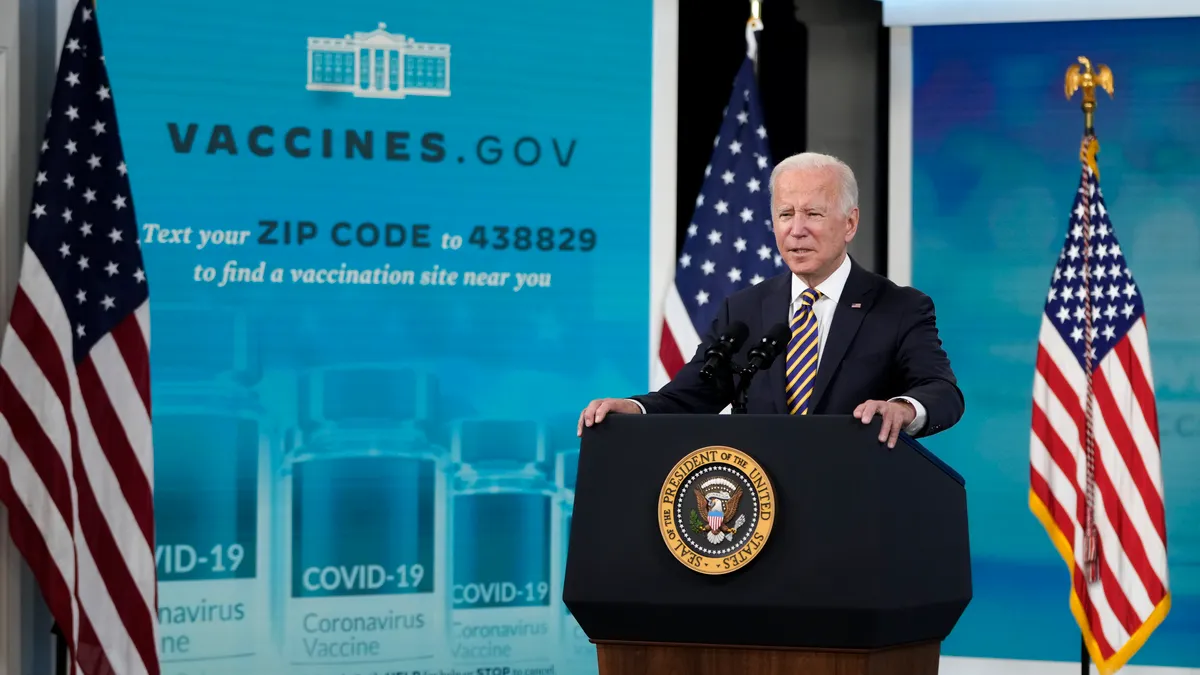Dive Brief:
- Several large universities lifted or suspended requirements that employees receive COVID-19 vaccines after a federal judge issued an injunction Tuesday blocking enforcement of an executive order from President Joe Biden that had mandated shots for federal contractors and subcontractors.
- Some notable research universities immediately suspending vaccination rules had only required the shots for employees in response to Biden's mandate. They include Auburn University, a public institution in Alabama, Baylor University, a private nonprofit institution in Texas, North Dakota State University and the University of Missouri System.
- But not every university that instituted an employee vaccine mandate after the executive order immediately overturned its requirements. Penn State University continues "to urge" employees to take steps to be fully compliant with the federal rules by a January deadline, including by uploading vaccination cards or applying for religious or medical exemptions, according to a spokesperson. Officials at the university plan to consider its position if the injunction remains in effect.
Dive Insight:
U.S. District Judge R. Stan Baker's nationwide injunction was the latest in a series of legal twists and turns for employers — including colleges — that must comply with a patchwork of local, state and federal regulations about vaccination requirements.
It came in a case filed against the Biden administration by several states and state agencies, led by Georgia. Plaintiffs included the University System of Georgia.
The court heard testimony from three institutions in the Georgia system — Augusta University, the Georgia Institute of Technology and the University of Georgia — during a Dec. 3 hearing. Together, those institutions have federal contracts worth almost $737 million in 2021.
One administrator testified Georgia Tech needed to "shift a tremendous amount of resources" quickly to set up the systems needed to track employee vaccination statuses. University officials also testified that they were worried covered employees wouldn't comply with the contractor mandate, leading them to leave and draining away talent.
About a fifth of Georgia Tech's employees covered by the mandate hadn't provided proof of vaccination. Less than half of covered employees at the University of Georgia had done so, and only 39% of covered employees at Augusta State had provided proof.
Baker cited the involvement of a large trade group in deciding to extend the injunction across the country. Not blocking the mandate, he wrote, would "force Plaintiffs to comply with the mandate, requiring them to make decisions which would significantly alter their ability to perform federal contract work which is critical to their operations."
Institutions that had been requiring vaccines under the contractor mandate started announcing rollbacks soon after the injunction.
The University of Georgia suspended requirements saying covered federal contractor employees must receive their final vaccine doses by a January deadline. Provisions of the executive order requiring mask wearing and physical distancing in contractor workplaces were also suspended, according to the university. But it said the injunction could be overturned and still encouraged both mask wearing and vaccination.
Tuesday's nationwide injunction follows another judge's ruling last week blocking enforcement of the contractor mandate in Kentucky, Ohio and Tennessee. In the wake of that ruling, several institutions, including the University of Memphis, University of Tennessee, Knoxville, East Tennessee State University, and the University of Dayton, in Ohio, suspended COVID-19 vaccine mandates.
Universities in Tennessee were an example of institutions trying to navigate a web of state and federal rules. They were able to require COVID-19 vaccines for employees under a state law that banned mandates unless institutions were at risk of losing federal funding.
Many colleges put their own vaccine requirements in place for employees and students before the start of the fall term, prior to when Biden issued his mandate. Courts including the U.S. Supreme Court have generally upheld colleges' ability to craft their own vaccination requirements with religious or medical exemptions, although different courts have in some cases blocked specific institutions' policies.
Even in cases where colleges haven't required shots, they have encouraged vaccination against COVID-19, said Peter McDonough, vice president and general counsel at the American Council on Education, a higher ed trade group. College leaders must weigh many considerations when deciding how to mandate or encourage vaccination, from legal implications to how strategies will be received locally, McDonough said.
"Unless a state or local law prohibits a vaccine requirement, colleges and universities, like other employers, are free to impose one, even absent a requirement from the federal government," McDonough said. "I think we'll continue to see a lot of schools do that. In states where there is an actual prohibition at the state or local level, that's more challenging. You've got to follow the law."















